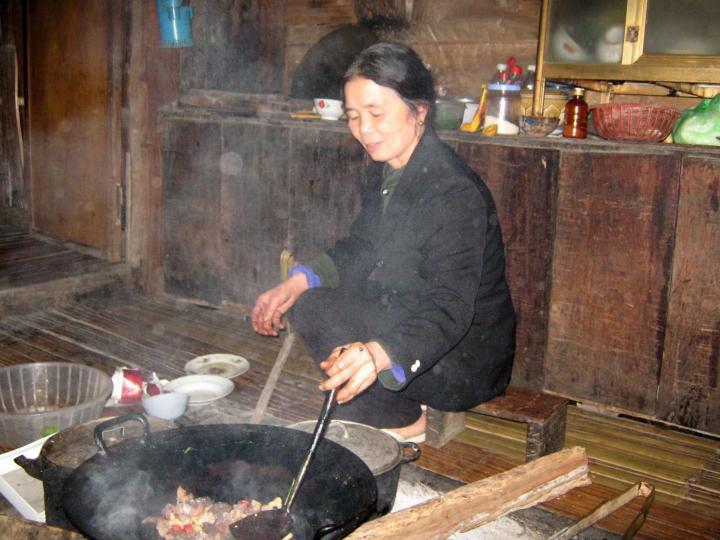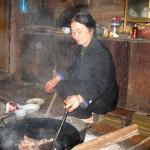Off the Beaten Track
At the head of the lake Tuan beached the boat. “Now we walk to guesthouse,” he said.We trudged uphill about a kilometer and reached the picturesque village of Pac Ngoi just as darkness descended. The hamlet contained a collection of about 50 houses, arrayed along a winding, dusty road. At least six of the buildings were “guest houses,” ours being a large wooden structure on stout stilts. It housed an extended family of about nine with tiny bedrooms for eight guests. I paled as we saw the single bathroom, tucked under narrow ladder-like stairs that led to the living quarters. Although the toilet was at least a flusher, the tiny sink was rust encrusted, and the shower a tap suspended at about shoulder height, the drain just a hole in the floor. None of this came as a complete surprise, and we ought to have remembered our own towels and facecloths, but a t-shirt from our packs would have to serve.
We ate a spectacular dinner, unlike anything we have experienced in terms of preparation and process. The large kitchen, the social center for the family, contained in its center a circular sand-lined fire pit. A two-burner propane gas cooker rested on a rough counter. The wall held a single shelf for dishes, pots and pans. Above, a row of nails organized cooking tools like tongs, dippers, long forks and the like. A large blackened wok on four three-inch legs squatted over long hardwood logs splayed out from the center of the pit like spokes on a wheel, their inboard end ablaze in flame and coals. Mama sat on her heels and managed the huge wok with expertise.
Our hosts invited the four of us to sit around a small table to take our dinner of chicken, pork, rice, greens and warm beer, while the extended family squatted and dined around a large bamboo tatami mat a few feet away. Two German guests sat on the floor in the kitchen eating roasted duck, which they had specially ordered, and watched China defeat Vietnam in a televised soccer match.
The men of the family and the eldest woman, her head bound in a traditional turban, remained seated around the tatami mat to sing and swig shots of rice vodka while the other women moved to the kitchen for clean up. As the singing and drinking became boisterous, the matriarch, a brown and wizened woman of at least 80 urged the rest of them on. Each time a song ended she would raise her glass, laugh lustily, shout a toast and then swill down her vodka in one long swallow. This struck us as some kind of drinking game, where singers were rewarded with a swig.
Tuan had become quite tipsy. He looked at home as he played a strange-looking stringed instrument and gulped back vodka. The Germans in the kitchen, also tipsy, commiserated with several locals over the lost soccer match. We retired to our room where a bamboo mat bed occupied most of the available space. Through the thin walls of cardboard the waning drunken chorus continued, along with whooping and shouting from the Germans as they tried to find their beds. After a brief lull, the night sounds of the revelers resumed — snores, farts, stage whispers and groaning — while chickens scratched and cats caterwauled beneath the floorboards.
* * * * *
 ThingsAsian
ThingsAsian














